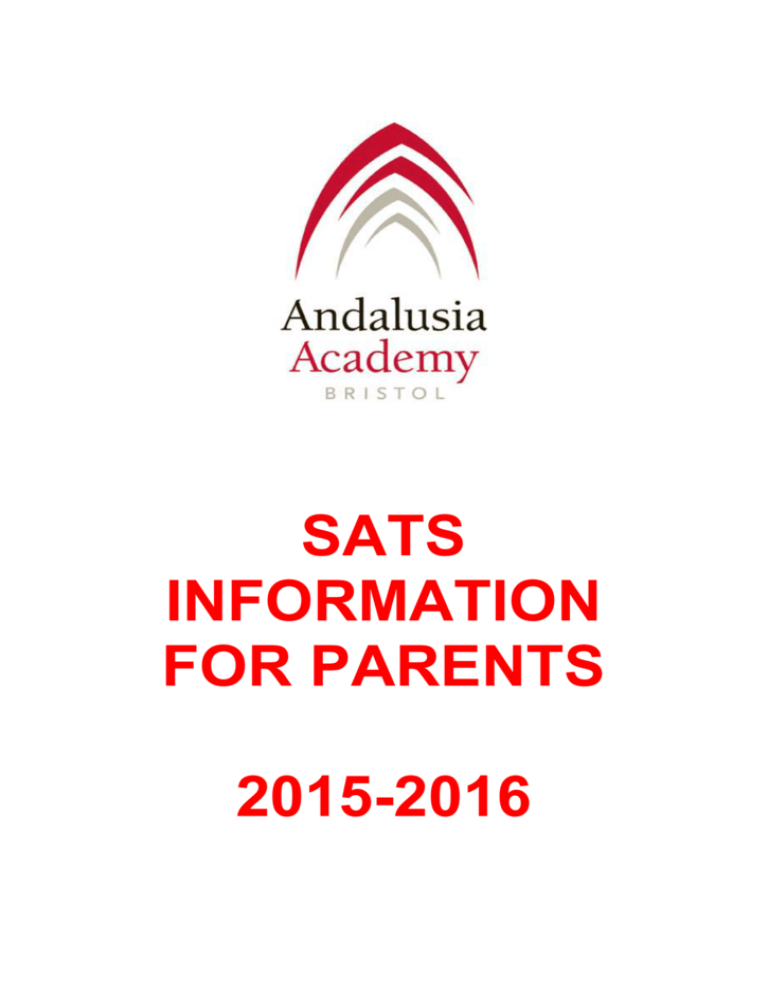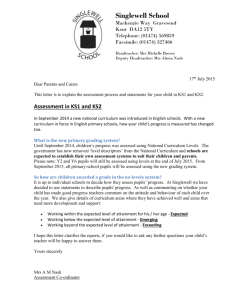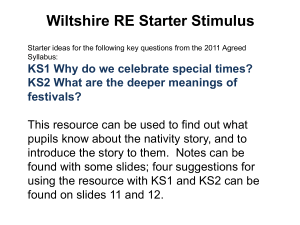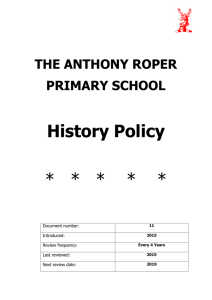SATs Information For Parents 2015-2016
advertisement

SATS INFORMATION FOR PARENTS 2015-2016 INFORMATION FOR PARENTS ON THE NEW ASSESSMENT FRAMEWORK FOR SATS What’s this all about? This academic year, our Year 2 and Year 6 pupils will be sitting the SATS tests in May 2016. These are official standardised tests which our pupils will be expected to take at the same time as other children their age in the country. These assessments will be useful in informing our teacher judgements about pupils in light of the recent removal of levels and will give us a clear indication of the ‘readiness of pupils’ for the next phase of their education. When are these tests? Mon 9 May 2016 English reading test, reading booklet and associated answer booklet Tues 10 May 2016 English grammar, punctuation and spelling test Paper 1, short answer questions English grammar, punctuation and spelling test Paper 2, spelling Wed 11 May 2016 Mathematics, Paper 1 Mathematics, Paper 2 reasoning Thurs 12 May 2016 Mathematics, Paper 3, reasoning What tests will my child be taking? Key Stage 1 will be doing the following papers: KS1 English, Grammar, punctuation and spelling Paper 1 KS1 English, Grammar, punctuation and spelling Paper 2 KS1 English Reading Paper 1 KS1 English Reading Paper 2 KS1 Mathematics Paper 1 Arithmetic KS1 Mathematics Paper 2 Reasoning Key Stage 2 will be doing the following papers: KS2 English, Grammar, punctuation and spelling Paper 1 KS2 English, Grammar, punctuation and spelling Paper 2 KS2 English Reading Paper KS2 Mathematics Paper 1 Arithmetic KS2 Mathematics Paper 2 Reasoning KS2 Mathematics Paper 3 Reasoning New National Curriculum tests A new national curriculum was introduced in 2014. As a result, the Standards and Testing Agency (STA) has changed the tests so that they assess the new curriculum. Pupils will take the new tests for the first time in May 2016. As part of the national curriculum review, levels have been abolished. This is in part in response to concerns about the validity and reliability of levels and sub-levels. These concerns had an impact on pupils’ learning, but also on the relationships between primary and secondary schools and the trust in their assessments. Levels have also been recognised as the driver of undue pace through the curriculum, which has led to gaps in pupils’ knowledge. The DfE has changed the way the tests are reported. From 2016, scaled scores will be used to report national curriculum test outcomes. Scaled scores Scaled scores are used all over the world. They help test results to be reported consistently from one year to the next. Scaled scores maintain their meaning over time so that two pupils achieving the same scaled score on two different tests will have demonstrated the same attainment. A pupil who achieves the national standard will have demonstrated sufficient knowledge in the areas assessed by the tests. This will mean that they are well placed to succeed in the next phase of their education. We will need to include results from the national curriculum tests in our annual reports to parents. We will need to report the pupil’s scaled score and whether or not they met the national standard. The old national curriculum levels are not relevant to the new national curriculum. However, in order to provide parents with some indication of the new standards, we have tried to indicate equivalence in a broad sense. At KS1 the national standard will roughly equate to an old level 2b. At KS2 this will roughly equate to an old level 4b. Otherwise levels and scaled scores will not be comparable. Decisions on which pupils to enter for the tests The new tests have been designed in such a way so that most pupils will be able to engage with some of the questions. The questions will be arranged in order of difficulty. Pupils will still be able to use access arrangements, eg readers or additional time, where appropriate. The DfE currently advise that pupils who aren’t expected to reach level 2 (KS1) or level 3 (KS2) of the national curriculum by May shouldn’t sit the tests. With the removal of levels, we will need to use our professional judgement as a school to determine whether it is appropriate for pupils to take the tests. We will be using mock tests to decide which pupils are working below the standard of the tests. Will there still be a level 6 paper? In the past, the DfE have produced level 6 tests for pupils who can demonstrate attainment above level 5. There won’t be separate tests for the most able from 2016. Instead the DfE has developed each test so that there is scope for higher attaining pupils to show their strengths.







![afl_mat[1]](http://s2.studylib.net/store/data/005387843_1-8371eaaba182de7da429cb4369cd28fc-300x300.png)
